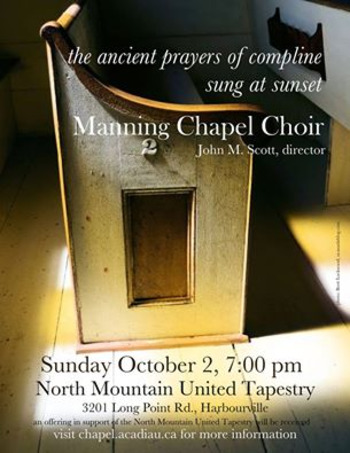Music Community Event Family-Friendly Wheelchair Accessible
[email protected]
The Manning Chapel Choir will sing the ancient service of Compline, or Night Prayers. The Compline rite is over a thousand years old, its beginning shrouded in history.
The early Christian Church established a daily cycle of prayer called the Hours. The eight Hours marked the day from dawn to fading light. The earliest formal description of Compline is found in St. Benedict’s Rule. St. Benedict called the final hour of the day Compline, from the Latin complere : to complete. He described in fewer than thirty words the form Compline would take for the next thousand years. He wanted the prayer kept simple: Psalm, hymn, chapter, blessing, and dismissal. “After Compline,” wrote St. Benedict, “no one may speak.”
In the early sixteenth century, the Reformation swept Europe, and the Anglican Church broke with Rome. King Henry VIII dissolved all the monasteries, where for hundreds of years monks had measured their days according to the Hours. The first Anglican Book of Common Prayer, published in 1549, collapsed the eight Hours into two: Matins in the morning, Evensong at sunset. Compline was subsumed into Evensong. It would not reappear in the Anglican Church as a separate office for another four hundred years.
The night prayer of Compline is practical again now in a way unforeseen during the Reformation. People use it not so much as part of a daily cycle of prayer, nor as one of the monastic Hours, but as a point of calm in a hectic week, as a “nightcap for the soul”.Through music that is centuries old, it draws people of all beliefs, or of none, and it joins them to one another.
Usually silence will greet those who enter, and candles offer most of the light. All are welcome
[email protected]
The Manning Chapel Choir will sing the ancient service of Compline, or Night Prayers. The Compline rite is over a thousand years old, its beginning shrouded in history.
The early Christian Church established a daily cycle of prayer called the Hours. The eight Hours marked the day from dawn to fading light. The earliest formal description of Compline is found in St. Benedict’s Rule. St. Benedict called the final hour of the day Compline, from the Latin complere : to complete. He described in fewer than thirty words the form Compline would take for the next thousand years. He wanted the prayer kept simple: Psalm, hymn, chapter, blessing, and dismissal. “After Compline,” wrote St. Benedict, “no one may speak.”
In the early sixteenth century, the Reformation swept Europe, and the Anglican Church broke with Rome. King Henry VIII dissolved all the monasteries, where for hundreds of years monks had measured their days according to the Hours. The first Anglican Book of Common Prayer, published in 1549, collapsed the eight Hours into two: Matins in the morning, Evensong at sunset. Compline was subsumed into Evensong. It would not reappear in the Anglican Church as a separate office for another four hundred years.
The night prayer of Compline is practical again now in a way unforeseen during the Reformation. People use it not so much as part of a daily cycle of prayer, nor as one of the monastic Hours, but as a point of calm in a hectic week, as a “nightcap for the soul”.Through music that is centuries old, it draws people of all beliefs, or of none, and it joins them to one another.
Usually silence will greet those who enter, and candles offer most of the light. All are welcome
Pricing & Tickets
Pricing: Donation

